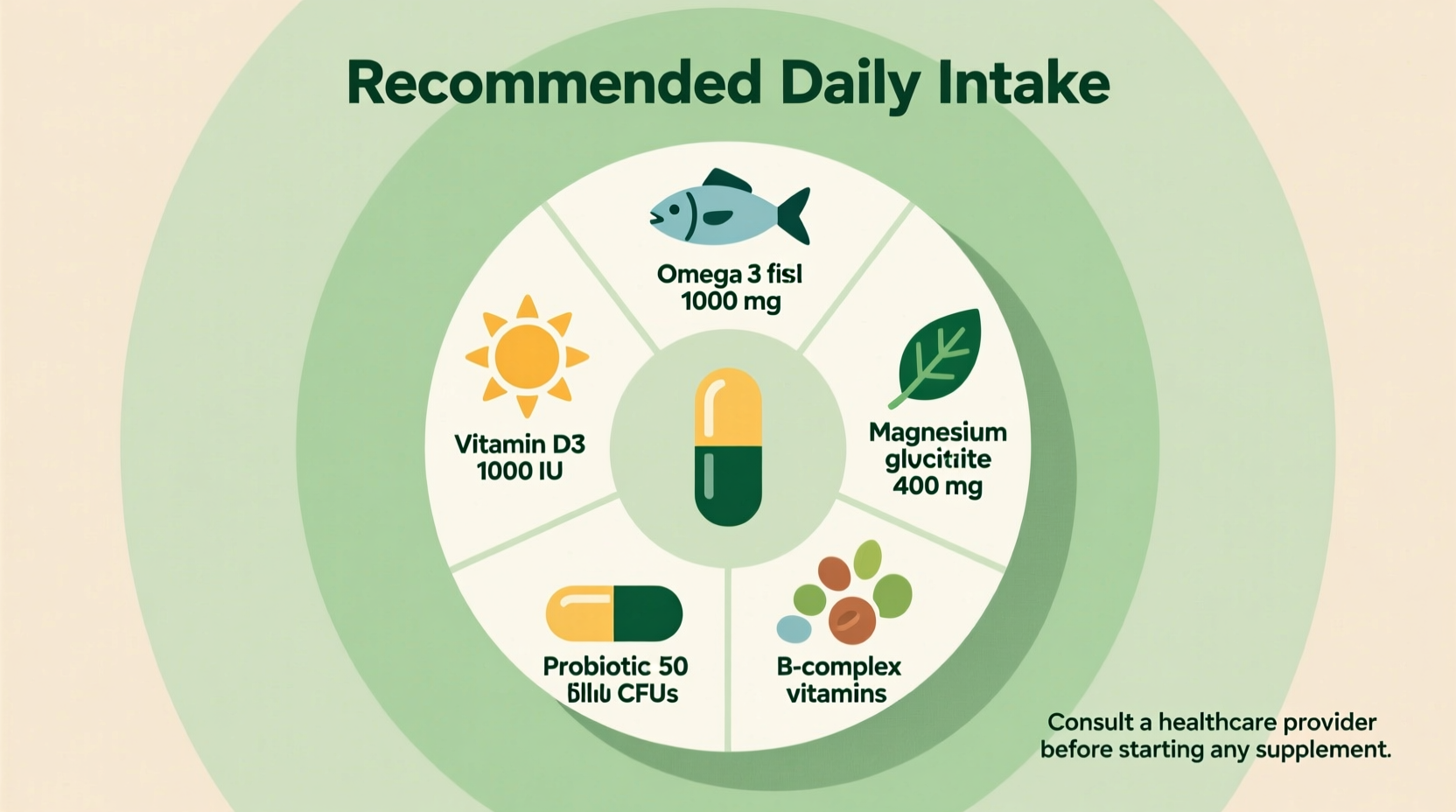Choosing the right supplements isn't about following trends or celebrity recommendations—it's a personalized decision based on your unique nutritional needs and health circumstances. With supplement sales exceeding $50 billion annually in the US alone, it's crucial to separate evidence-based recommendations from marketing hype.
Why There's No One-Size-Fits-All Supplement Solution
Unlike medications with standardized dosing, supplements require individual assessment. The National Institutes of Health emphasizes that "dietary supplements are not intended to treat, diagnose, prevent, or cure diseases" and shouldn't replace food. Your body absorbs nutrients differently from whole foods versus isolated supplements.
Consider these critical factors before adding any supplement to your routine:
- Your current dietary patterns and potential nutritional gaps
- Medical conditions and medications (many supplements interact dangerously with common prescriptions)
- Life stage (needs differ significantly between teens, adults, and seniors)
- Geographic location and sun exposure (affecting vitamin D synthesis)
- Genetic factors affecting nutrient metabolism
Step-by-Step: Determining Your Actual Supplement Needs
1. Assess Your Dietary Foundation First
Before considering supplements, evaluate your current eating pattern. The Harvard T.H. Chan School of Public Health notes that "a varied, balanced diet remains the best approach to obtaining essential nutrients." Most nutrient deficiencies stem from poor dietary patterns rather than insufficient supplementation.
Track your food intake for 3-7 days using a reliable app like MyFitnessPal or Cronometer. Look for consistent patterns of missing food groups that might indicate potential gaps:
- Frequent avoidance of dairy products → possible calcium/vitamin D concerns
- Limited fatty fish consumption → potential omega-3 deficiency
- Plant-based diet without careful planning → possible B12, iron, or zinc issues
- Rare consumption of leafy greens → potential folate concerns
2. Identify Potential Deficiency Symptoms
Certain symptoms may indicate specific nutrient deficiencies, though professional testing is required for confirmation:
| Symptom Pattern | Potential Deficiency | Common Sources |
|---|---|---|
| Fatigue, pale skin, shortness of breath | Iron | Red meat, spinach, lentils |
| Muscle cramps, irregular heartbeat | Magnesium | Nuts, seeds, leafy greens |
| Bone pain, muscle weakness | Vitamin D | Fatty fish, fortified dairy, sunlight |
| Numbness, balance issues | Vitamin B12 | Animal products, fortified foods |
Note: These symptoms overlap with many medical conditions. Never self-diagnose based on symptoms alone.
3. Get Professional Testing Before Supplementing
The Endocrine Society strongly recommends "laboratory confirmation of deficiency before initiating supplementation" for most nutrients. Blood tests provide objective data rather than guesswork:
- Vitamin D: 25-hydroxyvitamin D test
- Vitamin B12: Methylmalonic acid (MMA) test is more accurate than serum B12
- Iron status: Complete iron panel (ferritin, transferrin saturation, TIBC)
- Magnesium: Red blood cell magnesium test (more accurate than serum)
Many people waste money supplementing nutrients they already have in sufficient amounts. The Mayo Clinic reports that up to 70% of adults taking multivitamins have no nutritional deficiency that would warrant supplementation.

4. Evidence-Based Supplement Considerations
Based on current research from the National Institutes of Health Office of Dietary Supplements, these supplements show the strongest evidence for specific populations:
Vitamin D
Who might benefit: People with limited sun exposure, darker skin tones, living above 37° latitude, older adults Evidence level: Strong for bone health; moderate for immune function Recommended approach: Test levels first; supplement with 600-800 IU daily if deficient (higher doses may be needed under medical supervision)
Omega-3 Fatty Acids
Who might benefit: People with heart disease, those consuming less than two servings of fatty fish weekly Evidence level: Strong for triglyceride reduction; moderate for heart health Recommended approach: 250-500mg combined EPA/DHA daily for general health; higher doses require medical supervision
Vitamin B12
Who might benefit: Older adults, vegetarians/vegans, those with gastrointestinal conditions Evidence level: Strong for deficiency correction Recommended approach: Sublingual or high-dose oral supplements if deficient; dietary sources preferred when possible
Special Considerations by Life Stage
Adults Under 50
Generally require fewer supplements if eating a balanced diet. Focus on:
- Vitamin D if limited sun exposure
- Folate for women of childbearing age
- Iron for menstruating women with heavy periods
Adults Over 50
Age-related changes affect nutrient absorption:
- Vitamin B12 absorption decreases (up to 30% of adults over 50 have impaired absorption)
- Vitamin D requirements increase
- Calcium needs rise for bone health
Pregnancy Considerations
The American College of Obstetricians and Gynecologists recommends:
- 400mcg folic acid before conception and through early pregnancy
- Prenatal vitamins containing iron and other essential nutrients
- Avoidance of high-dose vitamin A supplements
Safety First: Critical Supplement Considerations
Medication Interactions You Must Know
Supplements can dangerously interact with common medications:
- Vitamin K interferes with blood thinners like warfarin
- St. John's Wort reduces effectiveness of birth control pills
- High-dose calcium affects absorption of thyroid medication
- Garlic supplements increase bleeding risk with anticoagulants
Always disclose all supplements to your healthcare provider, especially before surgeries or new prescriptions.
Quality Matters: Choosing Reputable Products
The FDA doesn't pre-approve supplements for safety or efficacy. Look for third-party verification seals from:
- USP (United States Pharmacopeia)
- NSF International
- ConsumerLab.com
These organizations verify product contents match label claims and check for contaminants. Research from Harvard Medical School shows up to 75% of supplements fail to contain what's listed on their labels when not third-party tested.
When to Consult Professionals
Before starting any supplement regimen, consider these professional consultations:
- Primary care physician: Discuss your health history and current medications
- Registered dietitian: Get personalized dietary assessment (find one at eatright.org)
- Pharmacist: Review potential medication interactions
The Academy of Nutrition and Dietetics emphasizes that "supplements should complement, not replace, a healthy diet" and professional guidance ensures you're addressing actual needs rather than marketing-driven concerns.
Red Flags in Supplement Advice
Be wary of claims that sound too good to be true:
- "Cures" for serious diseases
- "Miracle" or "secret" formulas
- Testimonials instead of scientific evidence
- Claims of working faster than pharmaceuticals
- Products requiring immediate purchase
The Federal Trade Commission regularly takes action against supplement companies making false health claims. When in doubt, verify claims through NIH's Office of Dietary Supplements resources at ods.od.nih.gov.
Conclusion: A Thoughtful Approach to Supplementation
The most effective supplement strategy starts with optimizing your diet, identifying actual deficiencies through testing, and working with healthcare professionals. Rather than asking "what supplements should I take," focus on "do I have a specific, verified need for supplementation?" This evidence-based approach prevents unnecessary spending and potential health risks while addressing genuine nutritional gaps.
Can I get all necessary nutrients from food alone?
Most healthy adults can meet nutrient needs through a varied, balanced diet. However, certain populations may require supplementation due to absorption issues, dietary restrictions, or increased needs. Vitamin D is commonly deficient even with good diets due to limited sun exposure in many regions.
How do I know if I'm taking too much of a supplement?
Symptoms of over-supplementation vary by nutrient. Excess vitamin D can cause nausea and kidney problems, too much iron leads to gastrointestinal issues, and excessive vitamin A causes dizziness and liver damage. Blood tests are the only reliable way to determine if you're exceeding safe levels. Always follow dosage recommendations from healthcare providers.
Are natural supplements better than synthetic ones?
Not necessarily. The body often processes natural and synthetic forms similarly. For example, synthetic folic acid is more bioavailable than natural folate from foods. "Natural" doesn't automatically mean safer or more effective—the quality and dosage matter more than the source. Third-party testing is crucial regardless of origin.
Should I take a multivitamin daily?
For most healthy adults eating a balanced diet, multivitamins provide little benefit. The US Preventive Services Task Force found insufficient evidence that multivitamins prevent cancer or heart disease in the general population. Targeted supplementation based on verified needs is more effective than broad-spectrum multivitamins.
How long does it take for supplements to work?
Timeframes vary significantly by nutrient and deficiency severity. Vitamin D levels may take 8-12 weeks to improve with proper dosing, while iron deficiency anemia requires 3-6 months of supplementation. Some nutrients like magnesium may provide noticeable effects within days, while others require consistent long-term use. Blood tests are necessary to verify effectiveness.











 浙公网安备
33010002000092号
浙公网安备
33010002000092号 浙B2-20120091-4
浙B2-20120091-4